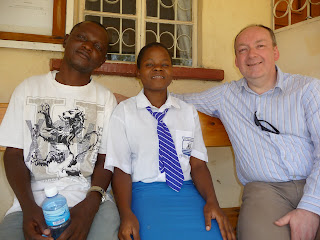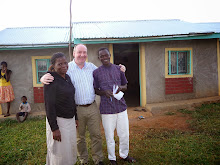 My last morning in Kisumu before the afternoon plane home could only really be spent at Kibos church.
My last morning in Kisumu before the afternoon plane home could only really be spent at Kibos church.Nicky and I enjoyed breakfast together at Sunset, before Anton came to pick us up. I packed my case, paid my bills and wished goodbye to the staff.
I have been coming to Sunset Hotel, overlooking Lake Victoria for 8 or 9 of the last 11 years since I first came. It has become a familiar second home. The staff greet me warmly by name “Hi Tim, How are you?” is asked of me at least two or three times a day and I have to say that I enjoy this familiarity.
I also enjoy the gardens and the birdlife. It is a place to think and to be at peace. It is an open air office for meetings and rich in illustrations for a budding preacher. This morning as Nicky and I sat waiting to be picked up a chameleon scuttled up and down the tree in front of us, a beautiful shining blue, the colour of the jacaranda flowers in the branches high above.
We had arranged to be picked up at 10:00.
Sure enough, on the dot of 10:35 Anton arrived. It was market day and the traffic was slow on the roads around Kondele. I loaded my case into the dusty boot of the Toyota and we headed for Kibos.
 This has been my church ever since we built it in 2002.
This has been my church ever since we built it in 2002.I can remember standing on the land as the timber frames were erected and the poles sunk into the ground, to be covered in concrete.
We had no idea if we would find a congregation amongst the varied houses and compounds that make up our village, just outside Kibos on the outskirts of Kisumu.
But today the church is flourishing. I guess we could do with some more seats and benches really, but we always seem to cram people into the available seats. The space at the back where we don’t have chairs, well that’s used for dancing.
As we pulled up at Kibos Anton let us out of the car at the house so that we could walk the hundred yards or so to the church.
I heard Nicky squeal with delight and turned round to see a real sight for sore eyes. Maynard, his wife Carolyn and their two 6 month old twin girls had just arrived on a couple of boda boda’s (obviously the children were being carried by their parents – although I have seen worse on Kisumu’s streets!)
We were thrilled to see them.

Maynard was in the very first group of boys we took in from the streets almost 10 years ago. He lived with Moses and Tatu at Kibos, progressing through school, before finding his independence. He now works with the Matatu’s, that ply their trade on Kisumu’s roads
We walked with Maynard and Carolyn to the church, where Moses was doing bible teaching.
Kenya church starts at 8 with prayer. Bible teaching from 9 until 10:30, then praise and worship for as long as it takes. The preacher usually comes on after 12 and often wont finish until well after 1pm. It’s a commitment that increasing numbers are staying all the way through.
Moses is a really talented worship leader. There is a small worship group in the church, with varying talents, and they provide backing and harmony to the songs. Isaiah tapped away on the keyboard, before Anton came on to play for the last couple of songs.
We sang and danced like it wasn’t 30 degrees and lost ourselves in wonder, praise and thanksgiving, the time just didn’t matter.
Then Moses invited me to preach the main message, which I happily did
I talked of Abraham, about his journey. About how God told him to leave the place he was and to walk with him. Abraham packed up his things and left. We are told that he camped between Bethel and Ai, between restoration and ruin, between the rubbish dump and the place of new life.
It was a picture of Abrahams prophetic destiny, brought about wholly be the grace of God. It also spoke to me of our vision, of our destiny, of our calling.
We are on a journey.
We made the choice, like Abraham, to step out and go when we were told. We haven’t reached the place of full restoration, that will come later when the least of these children will be first in the kingdom of heaven. But we, like Abraham, are now somewhere between Bethel and Ai, believing and trusting n God’s promises.
I thought back to my own promises, to Isaiah 58.
“I will be with you always. I will meet your needs in a sun scorched land”.
We are journeying, in the strength and by the grace of God.
In the great scheme of things, we have affected just a small number of lives here in Kisumu. But our boys are now spread out across Kenya, with children resettled in Mombasa on the east, Nairobi in the centre, Kitale and the Sudanese border in the north and of course Nyanza and Western province where we are concentrated,
Our first children are growing up and maybe, like Maynard, will soon have beautiful wives, husbands, children and families of their own.
I hope and pray that will be so, because I am a son of Abraham, an inheritor of God’s promises to him and like the stars in the sky I believe that our children will be so numerous they cannot be counted.
I felt so blessed today as I ate green grams and chapati’s in Kibos with Moses, Tatu, Maynard and Carolyn.
I was sad when it came time to depart for the airport for the short flight to Nairobi, clutching my gift from Moses of a CD of his debut album. I will play it when I get back to England. I will be happy to see my gorgeous family again, but sad to be leaving my beautiful Kenyan brothers and sisters and children and grand children too.
I fly to Amsterdam first thing in the morning, and then on to Manchester sometime tomorrow afternoon, but I hope to return in the late Autumn, when we are planning our music festival with the Isaiah Trust family.
Nicky has remained in Kisumu and will spend the next month there, visiting the children in the homes, in the schools and in their rural settlements, talking to them, encouraging them and planning their futures with them. She will soon be joined by Becky, then later by Hilary, Emma and Phil. I know that they are part of our family too, they share my love and passion and calling to this work.
May there forever be “Tumaini Mtaani” – Hope in the Streets.

























